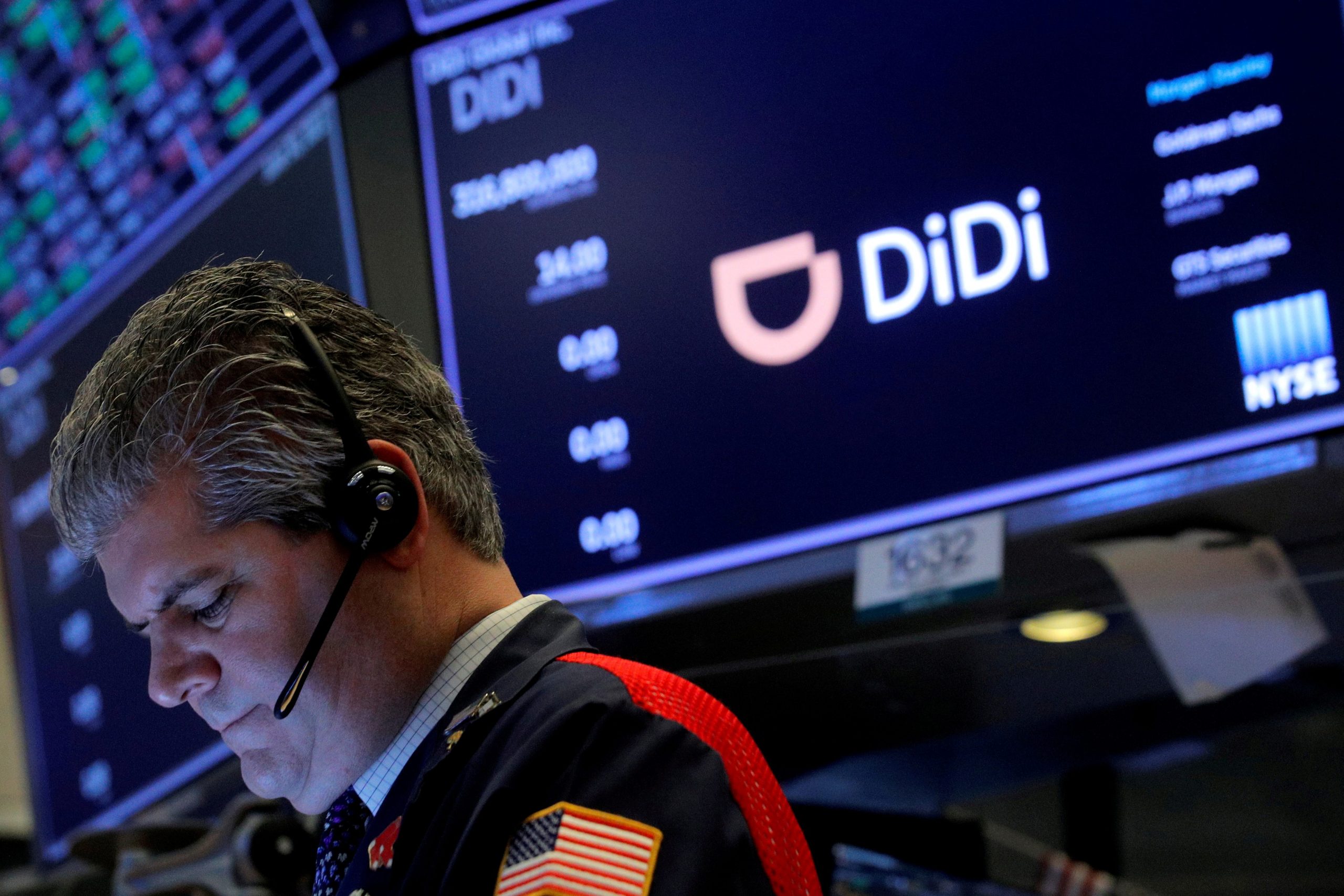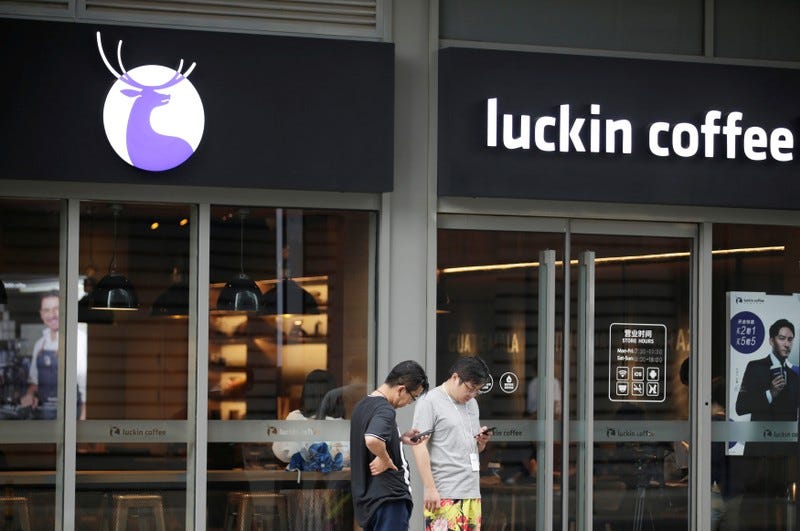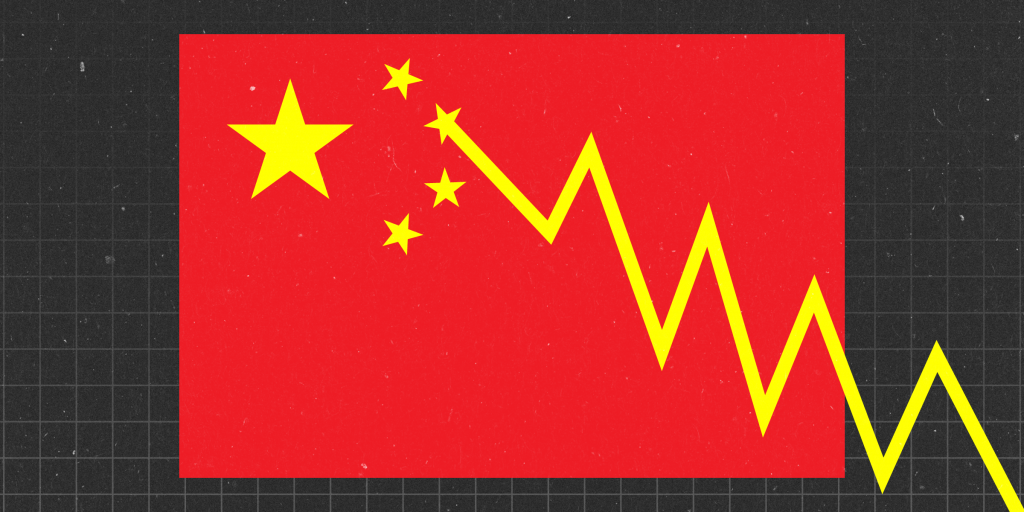It’s a truth universally acknowledged: Wall Street loves China.
Over the past year, the Financial Times reported, investors worldwide have bought more than $800 billion worth of Chinese stocks and bonds, a 40% increase compared with the year before. Goldman Sachs, JP Morgan Chase, Morgan Stanley, Citigroup, BlackRock, you name it, America’s largest and most powerful financial institutions are racing to do business in China. The legendary investor Ray Dalio, the founder of the world’s largest hedge fund, warned last year that the world was underweight Chinese stocks and bonds. Charlie Munger, Warren Buffett’s right-hand man, has repeatedly sung praises of the Chinese government for allowing businesses to flourish and people to make money.
Driven by an insatiable hunger for growth and profit, Wall Street has long looked to the world’s second-largest economy for opportunities. It helps that China exemplifies the kind of certainty that authoritarian regimes supposedly provide. As Larry Fink, the CEO of BlackRock, the world’s largest money manager, said 10 years ago: “Markets don’t like uncertainty. Markets like actually totalitarian governments, where you have an understanding of what’s out there.”
So it’s no wonder that when the hottest Chinese tech companies decide to go public on US exchanges, their order books are usually oversubscribed, meaning that demand by eager investors exceeds the available supply of shares. As of May, the US-China Economic and Security Review Commission said, there were 248 Chinese companies listed on US exchanges with a total market capitalization of $2.1 trillion.
But this month the “certainty” provided by an undemocratic regime started to seem less like a sure bet and more like a giant gamble. On July 2, only two days after the Chinese ride-hailing app Didi Global raised $4.4 billion in its debut on the New York Stock Exchange, Chinese regulators announced an investigation into the company on the grounds of protecting national security. Over the span of four weeks, Didi lost $29 billion in market value, and China proposed new rules requiring big tech companies to undergo a cybersecurity review before listing their shares on overseas markets. As a result, a slew of Chinese companies – including TikTok owner ByteDance, medical tech company LinkDoc, fitness app Keep, and vegetable-delivery startup Meicai – have all paused their plans to launch initial public offerings on Wall Street.

"China didn't anticipate big data becoming a powerful thing," Perth Tolle, the founder of Life + Liberty Indexes, told me. "Now that it is, they are cracking down on it." She pointed to Ant Financial, the fintech affiliate of Alibaba, which was forced to scuttle what was expected to be the world's largest IPO after founder Jack Ma made a series of brash comments condemning banking regulations in China. "This is not certainty," Tolle said. "This is a constraint on growth."
But China's crackdown on Big Tech is far from the most serious risk inherent in Chinese stocks. By skillfully exploiting two regulatory loopholes - one in Beijing and one in Washington - Chinese companies have evaded oversight both at home and abroad, keeping investors in the dark about the true state of their finances. The $2 trillion market for Chinese stocks is effectively a financial house of cards built on a shaky foundation of unaudited books and dubious shell companies.
"We've been saying for years that these structures are essentially untested under Chinese law, and the enforcement of these structures exists at the whim of the Chinese government," said Soren Aandahl, the chief investment officer of the hedge fund Blue Orca Capital. "When you have a government that can very quickly and arbitrarily change their position on the validity and enforceability of these contracts, or even whether some of these companies should list abroad, that's a massive risk to long-term stock ownership."
The loophole at the heart of a $2 trillion market
To skirt regulation at home, many Chinese companies that sell their shares overseas do so through a legal structure called a variable interest entity. The VIE, usually incorporated outside China, allows Chinese corporations to set up shell companies in tax havens such as the Cayman Islands or the British Virgin Islands. Before listing themselves on Wall Street, the shell companies enter into a complex web of contracts giving them de facto "ownership" of their Chinese parent corporation. When US investors think they're buying shares in a Chinese company like Didi, they're actually handing over their money to an empty shell company in the Cayman Islands that's set up contractual agreements with Didi in China.
China imposes severe restrictions on foreign ownership in Chinese companies that operate in sensitive sectors such as technology, media, and telecommunications. But the VIE loophole effectively enables Chinese firms to pose as foreign entities exempt from the ban on foreign investment.
The loophole has existed since 2000, when the Chinese media company Sina Corp. created a VIE to list itself on the Nasdaq. At first, China indicated it would crack down on the maneuver. "I remember when Sina first listed," said Anne Stevenson-Yang, the cofounder and research director of J Capital Research, which focuses on China. "The head of the Ministry of Post and Telecommunications held a press conference and said this is illegal - you can't have foreign ownership of Chinese telecom assets."
But in the end, Stevenson-Yang said, China's appetite for economic growth trumped its concerns about foreign investments in sensitive industries. "Beijing was thinking, 'If we can capture all this money, why not?'"
The VIE loophole opened a floodgate of foreign money. Over the past two decades, lured by the vast international pool of investor capital, and the prestige and liquidity that come from listing on Wall Street, Chinese companies have flocked to US exchanges. The South China Morning Post reported that some 100 VIE companies now make up about $4 trillion of capitalization in the MSCI China Index - including $700 billion from US investors.
Now, though, those investments face a significant risk. The China Securities Regulatory Commission is reportedly planning rule changes that would close the loophole, preventing Chinese companies from listing overseas even if they're selling shares through established VIE contracts. "The contracts themselves effectively mean nothing because they are governed by the legal system of the People's Republic of China," Dan David, the founder of Wolfpack Research, said. "American investors must understand that any of these companies could pull the plug at any time, leaving them holding worthless shares in an empty Cayman shell."
Stevenson-Yang, who also predicts the end of the VIE structure, believes that the Chinese government will gradually phase them out rather than institute an immediate ban. "They are not going to immediately say, 'All VIEs are just illegal and foreigners don't actually own anything,'" she said. "What they are going to do is require restructuring so that the VIEs are brought onshore. They will have some kind of restructuring and some kind of compensation. But eventually you are going to see the foreign interest kicked out of these companies."
From the best of both worlds to a double whammy
Chinese companies that list on US exchanges have also succeeded at evading financial oversight by US regulators. Citing concerns over national security, the Chinese government has long refused to let the Public Company Accounting Oversight Board - which was created by Congress to protect investors - from inspecting the audits of Chinese companies listed on Wall Street.
The lack of transparency has created what Aandahl, the hedge-fund executive, calls a "gross distortion field" surrounding Chinese companies traded on US exchanges. "There's a reason why Chinese companies are here," he said. "The US capital markets, which are the best and deepest in the world in terms of volume, are a very attractive place to raise capital. But if you want to list in the US markets, you have to abide by the same rules as everybody else. There's no true national-security reason why public companies' audit papers cannot be reviewed by the regulator in the market in which they have decided to raise capital."
Allowing companies to circumvent audit inspections or forensic accounting investigations, he added, practically incentivizes them to cook their books. "You're reducing the likelihood that someone's going to be caught and punished," he said.
The barriers to regulatory scrutiny have already cost investors dearly. Luckin Coffee, a challenger to Starbucks in China that was once a tech darling on the Nasdaq, was caught in an accounting scandal last year that led to its precipitous fall. After the company admitted to fabricating sales, its shares plunged 75% overnight. Luckin's stock, valued at $12 billion at its height, was swiftly delisted.

US regulators also failed to detect apparent misconduct by Didi. Three months before the company's planned IPO, cybersecurity regulators in China had asked Didi to delay going public, citing national-security concerns. But the company, facing pressure to list after raising billions of dollars from Masayoshi Son's SoftBank and other venture capitalists, pressed ahead despite the government warning.
The ride-hailing giant did not disclose that regulators "had already warned Didi to delay its IPO to conduct a self-examination of its network security," one of three class-action lawsuits filed by shareholders said. As a result, the registration statement it filed was "materially false and misleading and omitted to state material adverse facts." Didi is now awaiting "serious, perhaps unprecedented" penalties from Chinese regulators, who've been stationed at the firm's headquarters for onsite inspection.
Like Beijing, Washington is moving to impose more oversight on Chinese companies seeking foreign investments. This week, following Didi's near-collapse, the Securities and Exchange Commission ordered Chinese companies listing on US stock exchanges to disclose potential risks of government intervention. And last year, Congress passed the Holding Foreign Companies Accountable Act, which requires foreign companies to be audited by the Public Company Accounting Oversight Board or face being delisted on US exchanges.
By shifting their status depending on where they're doing business, Chinese companies have essentially enjoyed the best of both worlds. At home, they use offshore dummy corporations to pose as foreign entities; abroad, they position themselves as fully Chinese, exploiting geopolitical tensions to evade oversight in the name of national security. Now, thanks to their efforts to assert a kind of dual citizenship, they're facing a double whammy.
"It may not be a question of just the United States saying, 'You have to comply with these rules or get off our exchanges,'" Aandahl said. "There's also added pressure from the Chinese side that the level of sensitivity of the data and the operations of the companies that are listed abroad are potentially unacceptable."
Risky investments or undervalued opportunities?
Despite the moves toward added oversight, the US remains a magnet for Chinese companies seeking to go public. As of July 12, there were still about 70 private firms based in Hong Kong and mainland China set to go public in New York, data compiled by Bloomberg showed.
But the IPO pipeline could soon dry up. On July 23, news emerged that Chinese regulators were considering turning after-school-tutoring companies into nonprofits, which might bar them from going public. Chinese education stocks tanked on the announcement, which would effectively make the entire $100 billion sector "un-investable," JPMorgan analysts said. As of this week, Chinese stocks have lost $769 billion in market value since their peak in February.
For some investors, the regulatory crackdown on US-listed Chinese companies has meant a tectonic shift. Cathie Wood, the CEO of ARK Invest who commands a cultlike following among retail investors, has been selling off Chinese tech stocks. Since February, the share of Chinese stocks in her flagship Ark Innovation ETF has plunged from a high of 8% to less than 1%.
"We realized that China had reached a point - and many of these mega-cap stocks and their leaders - had reached a point where the Chinese government was beginning to feel a challenge, something that they would not tolerate," Wood said during a July 15 webinar. "That does cast a pall over entrepreneurs in the nation who really want to hit mega-cap status."
Wood is not completely ruling out China in her funds. But in her view, the era of China's growth-at-all-costs approach to regulation is coming to an end, as the government focuses on protecting against leaks of sensitive data. "That point has been exacerbated by this surprise that the Biden administration is holding as tough a line on China as the Trump administration was," she said. "Chinese companies are going to have to continue to look more inward for their growth."
Other investors, seeing an opportunity to buy on the cheap, are doubling down on Chinese tech stocks. The KraneShares CSI China Internet ETF, with $5.1 billion in assets, saw two days of record inflows while many companies in the fund were bearing the brunt of Chinese regulatory actions. "In some sense, uncertainty actually has declined now that everything is out on the table," said Jason Hsu, whose Rayliant Global Advisors manages $26 billion in Chinese and other emerging-markets assets. "It may actually be the case that prices will fall enough in the next few months for them to be a good investment. When prices fall enough, everything becomes interesting."
Tiffany Hsiao, the portfolio manager of the Artisan China Post-Venture Strategy, also views the negative effects of regulatory actions against Chinese companies as transitory. "I believe this will have a short-term impact on fundraising for Chinese companies - namely delaying their ability to become publicly listed," she told me in an email. "However, our fundamental belief is that great companies will find capital, even if it takes a little longer than initially planned."
Tolle, of Life + Liberty, disagrees. She points to the iShares China Large-Cap ETF (FXI), which tracks the 50 largest Chinese companies. Over the past decade, it's generated a cumulative return of only 39.55% as of June 30. In the long run, she believes, Chinese stocks offer more risk than reward.
"In the last 10 years, China has grown tremendously, but foreign investors did not take part in that," Tolle said. "These American Wall Street storytellers are going to continue to spin their narratives and tell you to buy these stocks. But look at the numbers. The Chinese stock market has not put up the numbers to justify or to reflect these narratives."

